The devout king Titurel has received two wondrous relics from the Angels, the Holy Grail (the cup from which Christ drank at the Last Supper and in which his blood was caught when he was crucified) and the spear with which his side was pierced. They are kept in the Castle of the Grail. Titurel has founded a Brotherhood of Knights who, miraculously strengthened by the relics, ride out into the world to help those in distress. The knight Klingsor tried to gain acceptance into the Brotherhood, but could not fulfil the law of chastity and so castrated himself in order to kill off his lustful desires. Titurel turned him away, and in revenge Klingsor transformed part of the surrounding wilderness into a magic castle and garden. Here he has created bewitching young maidens whose purpose is to seduce the knights, and he ultimately hopes to gain possession of the Grail. Amfortas, having taken over as king of the Grail from his father Titurel, sees that an increasing number of knights are falling under Klingsor´s power and so leaves to do battle with the evil magician, armed with the sacred spear. However, he is seduced by a mysterious maiden. Klingsor seizes the spear and inflicts a wound in Amfortas´ side. This wound will not close, and the king is left in agony.
Act One – Autumn
A clearing near the Castle of the Grail. Gurnemanz, an elderly knight, rouses the squires from morning prayer and instructs them to prepare for the king´s daily bath in the Holy Lake. A woman comes riding by in a great hurry. It is Kundry, enigmatic messenger of the knights of the Grail. She selflessly undergoes tribulation to serve the Brotherhood, yet always remains abrupt and cold. She has brought a balsam from afar in an attempt to heal the wounded Amfortas, and falls to the ground exhausted. The king is borne in on a litter. He has spent another night in great pain; a medicinal herb brought to him by the knight Gawain has proved to be ineffective. He now wants to try the balsam procured by Kundry, but she remarks with despairing scorn that this too will be of no use.
The king is carried to the lake. The squires, who regard Kundry with apprehension and suspicion, call her a heathen and a sorceress, but Gurnemanz comes to the help of the "wild woman", reminding the squires of her devoted services to the Grail. The squires suggest that she be sent off to recover the missing spear, but Gurnemanz says that only a hero chosen by God may perform this task. He tells of the building of the Castle of the Grail by Titurel, of Klingsor´s repudiation and revenge, of the loss of the spear and Amfortas´ wound, and of the divine prophecy that only a "pure fool", enlightened through compassion, can save the king.
Suddenly, raised voices are heard from the direction of the lake. A youth has fired an arrow at a swan circling above the water. The knights bring the dead bird and the wrongdoer to Gurnemanz, who chastises the naive youth. He is ashamed of what he has done and breaks his bow. The stranger is Parsifal, who knows neither his own name nor anything of his parents. He knows only that his mother is called "Herzeleide" (Heart´s sorrow). Kundry explains that he is the son of Gamuret who was killed in battle. Herzeleide had wanted to keep her son from becoming a knight, and so had brought him up in a lonely wood. One day, however, Parsifal saw two knights on horseback. He went after them, leaving behind his mother who later died of a broken heart. Gurnemanz believes that this is the "pure fool" of the prophecy. At this point Kundry falls asleep as if overcome by some invisible power, and Gurnemanz takes the young man to the Castle of the Grail.
The knights gather in the hall of the Castle for the ceremony of the unveiling of the Grail. Amfortas is brought in. Titurel´s voice is heard, as if from the grave. He is kept alive by regularly beholding the Grail, and bids his son carry out his office. Amfortas tells of the agony to which he must return after seeing the Grail, and beseeches his father to unveil the Grail himself. However, Titurel and the knights insist that the form of the ceremony be strictly adhered to. The Grail is solemnly unveiled. The blood of Christ glows with a wondrous light and the knights partake of the Lord´s supper. Amfortas is carried away, overcome once more by terrible pain from his incurable wound. Parsifal has watched the proceedings in complete silence. Gurnemanz assumes that he was wrong in believing Parsifal to be the promised redeemer and angrily dismisses the youth. A voice from on high repeats the prophecy.
Act Two – Winter
Sitting in his tower, Klingsor looks into a magic mirror and watches Parsifal approach; in order to rob the youth of his purity, he conjures up Kundry, who is in a trance-like state under his command. She had mocked Christ as he hung dying on the cross, and was condemned to live forever, carrying out her sentence as both the penitent servant of the Grail and a seductress under Klingsor´s power. She longs for death and redemption. These can be brought only by a man who is able to resist her, but as yet all have succumbed to her charms, including Amfortas himself. She mocks Klingsor´s enforced "chastity" and at first refuses to bring ruin on the approaching Parsifal, but she is powerless to resist her master´s command. When Parsifal reaches the castle, Klingsor sends out the renegade knights of the Grail to meet him, but the young man routs them all and descends into the garden.
There he meets the Flower Maidens, Klingsor´s creations, but he is not distracted by their childish teasing. Kundry approaches, transformed into a woman of magnificent beauty, and calls the young man by his name for the first time. She dismisses the Flower Maidens and tells Parsifal about his mother´s death. She offers the penitent and guilt-conscious Parsifal "as a last token of mother´s blessing the first kiss of love" in order to comfort him. Clasped in her arms Parsifal suddenly realises how tragedy befell Amfortas; he even thinks he can feel the pain caused by the spear wound. As foretold in the prophecy, "compassion" has enlightened him, but he remains "pure" for he pushes Kundry aside. She tells him of the curse and of her endless quest for redemption, which she hopes to find in Parsifal´s embrace. Parsifal, however, refuses to succumb and, having realised that it is he himself who has been chosen to save the world of the Grail, instead asks her to show him the way to Amfortas. Kundry curses him, saying that he shall never find the way, and calls on Klingsor for help. Klingsor appears, and hurls the stolen spear at Parsifal. But the relic cannot be used as a weapon against Parsifal, and it comes to rest in the air above his head. Parsifal seizes hold of it and makes the sign of the cross, whereupon Klingsor´s castle and garden vanish. Parsifal sets out for the Grail.
Act Three – Spring
It is the morning of Good Friday. Gurnemanz, who is now living as a hermit in a wood, finds Kundry in the forest undergrowth. She is nearly dead, but slowly she comes to her senses. When she realises where she is she begins to perform her tasks without saying a word. Gurnemanz is astounded to see that she has changed into a quiet and humble creature. An unknown knight suddenly appears, dressed in full armour. When Gurnemanz hints that this apparel is not appropriate on a Holy Day, the stranger lifts his visor. It is Parsifal who, after a long period of wandering, is finally on his way to the Castle of the Grail. Gurnemanz joyfully recognises the spear and hails Parsifal as the redeemer, explaining that since the last unveiling ceremony Amfortas has refused to reveal the Grail and has thus brought about the impoverishment of the Brotherhood and the death of Titurel. However, Amfortas is now repentant at what he has done and has decided to carry out his office at the old king´s funeral. Kundry washes Parsifal´s feet and dries them with her hair. Using water from the holy stream Gurnemanz washes all guilt from Parsifal´s head and then anoints him new king of the Grail. His first task as king is to baptise Kundry. Parsifal remarks on the beauty of the meadows which are bedecked with spring flowers. Gurnemanz explains the "Good Friday magic", which causes even the natural world to rejoice at Christ´s redemption of man. The midday bell is heard, announcing the funeral ceremony at the Castle of the Grail. Parsifal takes up the spear and follows Gurnemanz and Kundry.
The knights of the Grail assemble in the Great Hall. Shaken and penitent, Amfortas beseeches his dead father to intercede with God on his behalf. The knights press him to reveal the Grail, but he refuses and asks them to kill him instead. At this point Parsifal enters and closes Amfortas´ wound with a touch of the spear. A white dove descends from on high and hovers above Parsifal´s head. Kundry has found redemption.
Place: Near the seat of the Grail
Act I
n a forest near the home of the Grail and its Knights, Gurnemanz, eldest Knight of the Grail, wakes his young squires and leads them in prayer. He sees Amfortas, King of the Grail Knights, and his entourage approaching. Amfortas has been injured by his own Holy Spear, and the wound will not heal.
Vorspiel
Musical introduction to the work with a duration of c. 9–13 minutes.
Scene 1
Gurnemanz asks the lead Knight for news of the King's health. The Knight says the King has suffered during the night and is going early to bathe in the holy lake. The squires ask Gurnemanz to explain how the King's injury can be healed, but he evades their question and a wild woman – Kundry – bursts in. She gives Gurnemanz a vial of balsam, brought from Arabia, to ease the King's pain and then collapses, exhausted.
Amfortas arrives, borne on a stretcher by Knights of the Grail. He calls out for Gawain, whose attempt at relieving the King's pain had failed. He is told that Gawain has left again, seeking a better remedy. Raising himself somewhat, the King says going off without leave ("Ohn' Urlaub?") is the sort of impulsiveness which led himself into Klingsor's realm and to his downfall. He accepts the potion from Gurnemanz and tries to thank Kundry, but she answers abruptly that thanks will not help and urges him onward to his bath.
The procession leaves. The squires eye Kundry with mistrust and question her. After a brief retort, she falls silent. Gurnemanz tells them Kundry has often helped the Grail Knights but that she comes and goes unpredictably. When he asks directly why she does not stay to help, she answers, "I never help! ("Ich helfe nie!"). The squires think she is a witch and sneer that if she does so much, why will she not find the Holy Spear for them? Gurnemanz reveals that this deed is destined for someone else. He says Amfortas was given guardianship of the Spear, but lost it as he was seduced by an irresistibly attractive woman in Klingsor's domain. Klingsor grabbed the Spear and stabbed Amfortas. The wound causes Amfortas both suffering and shame, and will never heal on its own.
Squires returning from the King's bath tell Gurnemanz that the balsam has eased the King's suffering. Gurnemanz's own squires ask how it is that he knew Klingsor. He solemnly tells them how both the Holy Spear, which pierced the side of the Redeemer on the Cross, and the Holy Grail, which caught the flowing blood, had come to Monsalvat to be guarded by the Knights of the Grail under the rule of Titurel, father of Amfortas. Klingsor had yearned to join the Knights but, unable to keep impure thoughts from his mind, resorted to self-castration, causing him to be expelled from the Order. Klingsor then set himself up in opposition to the realm of the Grail, learning dark arts, claiming the valley domain below and filling it with beautiful Flowermaidens to seduce and enthrall wayward Grail Knights. It was here that Amfortas lost the Holy Spear, kept by Klingsor as he schemes to get hold of the Grail as well. Gurnemanz tells how Amfortas later had a holy vision which told him to wait for a "pure fool, enlightened by compassion" ("Durch Mitleid wissend, der reine Tor") who will finally heal the wound.
At this moment, cries are heard from the Knights ("Weh! Weh!"): a flying swan has been shot, and a young man is brought forth, a bow in his hand and a quiver of matching arrows. Gurnemanz speaks sternly to the lad, saying this is a holy place. He asks him outright if he shot the swan, and the lad boasts that if it flies, he can hit it ("Im Fluge treff' ich was fliegt!") Gurnemanz tells him that the swan is a holy animal, and asks what harm the swan had done him, and shows the youth its lifeless body. Now remorseful, the young man breaks his bow and casts it aside. Gurnemanz asks him why he is here, who his father is, how he found this place and, lastly, his name. To each question the lad replies, "I don't know." The elder Knight sends his squires away to help the King and now asks the boy to tell what he does know. The young man says he has a mother, Herzeleide (Heart's Sorrow) and that he made the bow himself. Kundry has been listening and now tells them that this boy's father was Gamuret, a knight killed in battle, and also how the lad's mother had forbidden her son to use a sword, fearing that he would meet the same fate as his father. The youth now recalls that upon seeing knights pass through his forest, he had left his home and mother to follow them. Kundry laughs and tells the young man that, as she rode by, she saw Herzeleide die of grief. Hearing this, the lad first lunges at Kundry but then collapses in grief. Kundry herself is now weary for sleep, but cries out that she must not sleep and wishes that she might never again waken. She disappears into the undergrowth.
Gurnemanz knows that the Grail draws only the pious to Monsalvat and invites the boy to observe the Grail rite. The youth does not know what the Grail is, but remarks that as they walk he seems to scarcely move, yet feels as if he is traveling far. Gurnemanz says that in this realm time becomes space ("Zum Raum wird hier die Zeit").
Verwandlungsmusik (Transformation)
An orchestral interlude of about 4 minutes.
Scene 2
They arrive at the Hall of the Grail, where the Knights are assembling to receive Holy Communion ("Zum letzten Liebesmahle"). The voice of Titurel is heard, telling his son, Amfortas, to uncover the Grail. Amfortas is wracked with shame and suffering ("Wehvolles Erbe, dem ich verfallen"). He is the guardian of these holy relics yet has succumbed to temptation and lost the Spear. He declares himself unworthy of his office. He cries out for forgiveness ("Erbarmen!") but hears only the promise that he will one day be redeemed by the pure fool.
On hearing Amfortas' cry, the youth appears to suffer with him, clutching at his heart. The knights and Titurel urge Amfortas to reveal the Grail ("Enthüllet den Gral"), and he finally does. The dark hall is now bathed in the light of the Grail as the Knights eat. Gurnemanz motions to the youth to participate, but he seems entranced and does not. Amfortas does not share in taking communion and, as the ceremony ends, collapses in pain and is carried away. Slowly the hall empties leaving only the young man and Gurnemanz, who asks him if he has understood what he has seen. When the lad cannot answer, Gurnemanz dismisses him as just a fool and sends him out with a warning to hunt geese, if he must, but to leave the swans alone. A voice from high above repeats the promise: "The pure fool, enlightened by compassion".
Act II
Vorspiel
Musical introduction of c. 2–3 minutes.
Scene 1
Klingsor's magic castle. Klingsor conjures up Kundry, waking her from her sleep. He calls her by many names: First Sorceress (Urteufelin), Hell's Rose (Höllenrose), Herodias, Gundryggia and, lastly, Kundry. She is now transformed into an incredibly alluring woman, as when she once seduced Amfortas. She mocks Klingsor's mutilated condition by sarcastically inquiring if he is chaste ("Ha ha! Bist du keusch?"), but she cannot resist his power. Klingsor observes that Parsifal is approaching and summons his enchanted knights to fight the boy. Klingsor watches as Parsifal overcomes his knights, and they flee. Klingsor wishes destruction on their whole race.
Klingsor sees this young man stray into his Flowermaiden garden and calls to Kundry to seek the boy out and seduce him, but when he turns, he sees that Kundry has already left on her mission.
Scene 2
The triumphant youth finds himself in a wondrous garden, surrounded by beautiful and seductive Flowermaidens. They call to him and entwine themselves about him while chiding him for wounding their lovers ("Komm, komm, holder Knabe!"). They soon fight and bicker among themselves to win his devotion, to the point that he is about to flee, but then a voice calls out, "Parsifal!" He now recalls this name is what his mother called him when she appeared in his dreams. The Flowermaidens back away from him and call him a fool as they leave him and Kundry alone.
Parsifal wonders if the Garden is a dream and asks how it is that Kundry knows his name. Kundry tells him she learned it from his mother ("Ich sah das Kind an seiner Mutter Brust"), who had loved him and tried to shield him from his father's fate, the mother he had abandoned and who had finally died of grief. She reveals many parts of Parsifal's history to him and he is stricken with remorse, blaming himself for his mother's death. He thinks himself very stupid to have forgotten her. Kundry says this realization is a first sign of understanding and that, with a kiss, she can help him understand his mother's love. As they kiss Parsifal suddenly recoils in pain and cries out Amfortas' name: he feels the wounded king's pain burning in his own side and now understands Amfortas' passion during the Grail Ceremony ("Amfortas! Die Wunde! Die Wunde!"). Filled with this compassion, Parsifal rejects Kundry's advances.
Furious that her ploy has failed, Kundry tells Parsifal that if he can feel compassion for Amfortas, then he should be able to feel it for her as well. She has been cursed for centuries, unable to rest, because she saw Christ on the cross and laughed at His pains. Now she can never weep, only jeer, and she is enslaved to Klingsor as well. Parsifal rejects her again but then asks her to lead him to Amfortas. She begs him to stay with her for just one hour, and then she will take him to Amfortas. When he still refuses, she curses him to wander without ever finding the Kingdom of the Grail, and finally calls on her master Klingsor to help her.
Klingsor appears and throws the Spear at Parsifal, but it stops in midair, above his head. Parsifal takes it and makes the sign of the Cross with it. The castle crumbles and the enchanted garden withers. As Parsifal leaves, he tells Kundry that she knows where she can find him.
Act III
Vorspiel
Musical introduction of c. 4–6 minutes.
Scene 1
The scene is the same as that of the opening of the opera, in the domain of the Grail, but many years later. Gurnemanz is now aged and bent. It is Good Friday. He hears moaning near his hermit's hut and discovers Kundry unconscious in the brush, as he had many years before ("Sie! Wieder da!"). He revives her using water from the Holy Spring, but she will only speak the word "serve" ("Dienen"). Gurnemanz wonders if there is any significance to her reappearance on this special day. Looking into the forest, he sees a figure approaching, armed and in full armour. The stranger wears a helmet and the hermit cannot see who it is. Gurnemanz queries him and chides him for being armed on sanctified ground and on a holy day, but gets no response. Finally, the apparition removes the helmet and Gurnemanz recognizes the lad who shot the swan, and joyfully sees that he bears the Holy Spear.
Parsifal tells of his desire to return to Amfortas ("Zu ihm, des tiefe Klagen"). He relates his long journey, how he wandered for years, unable to find a path back to the Grail. He had often been forced to fight, but never wielded the Spear in battle. Gurnemanz tells him that the curse preventing Parsifal from finding his right path has now been lifted, but that in his absence Amfortas has never unveiled the Grail, and lack of its sustaining properties has caused the death of Titurel. Parsifal is overcome with remorse, blaming himself for this state of affairs. Gurnemanz tells him that today is the day of Titurel's funeral, and that Parsifal has a great duty to perform. Kundry washes Parsifal's feet and Gurnemanz anoints him with water from the Holy Spring, recognizing him as the pure fool, now enlightened by compassion, and as the new King of the Knights of the Grail.
Parsifal looks about and comments on the beauty of the meadow. Gurnemanz explains that today is Good Friday, when all the world is renewed. Parsifal baptizes the weeping Kundry. Tolling bells are heard in the distance. Gurnemanz says "Midday: the hour has come. My lord, permit your servant to guide you!" ("Mittag: – Die Stund ist da: gestatte Herr, dass dich dein Knecht geleite") – and all three set off for the castle of the Grail. A dark orchestral interlude ("Mittag") leads into the solemn gathering of the knights.
Scene 2
Within the castle of the Grail, Amfortas is brought before the Grail shrine and Titurel's coffin. He cries out, asking his dead father to grant him rest from his sufferings and expresses the desire to join him in death ("Mein Vater! Hochgesegneter der Helden!"). The Knights of the Grail passionately urge Amfortas to uncover the Grail again but Amfortas, in a frenzy, says he will never again show the Grail. He commands the Knights, instead, to kill him and end his suffering and the shame he has brought on the Knighthood. At this moment, Parsifal steps forth and says that only one weapon can heal the wound ("Nur eine Waffe taugt"). He touches Amfortas' side with the Spear and both heals and absolves him. Parsifal commands the unveiling of the Grail. As all present kneel, Kundry, released from her curse, sinks lifeless to the ground as a white dove descends and hovers above Parsifal.


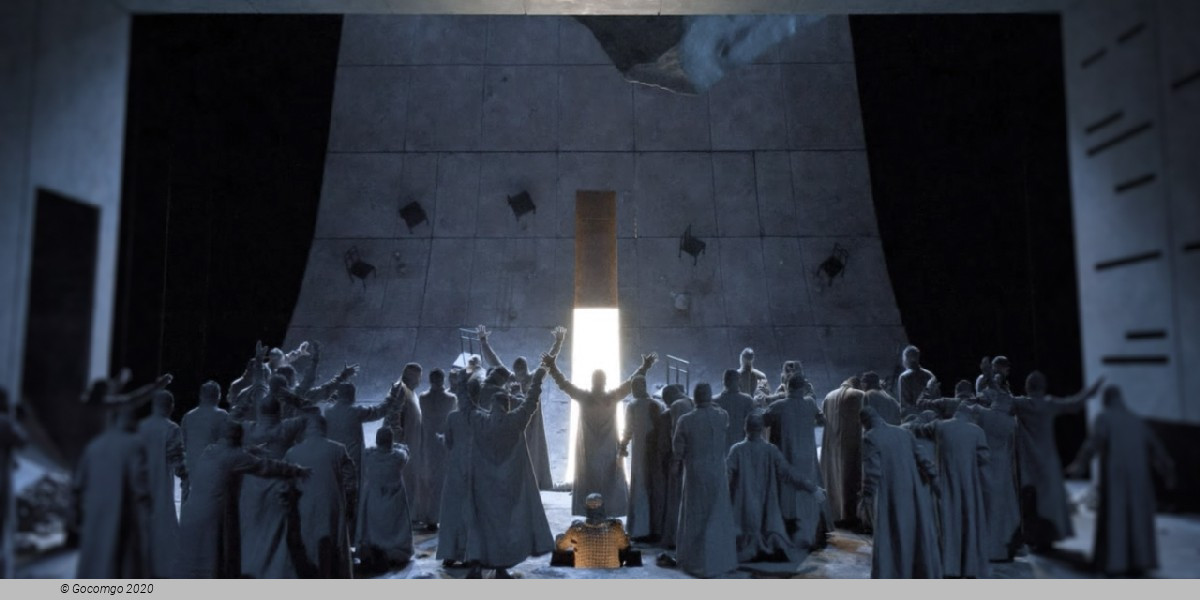
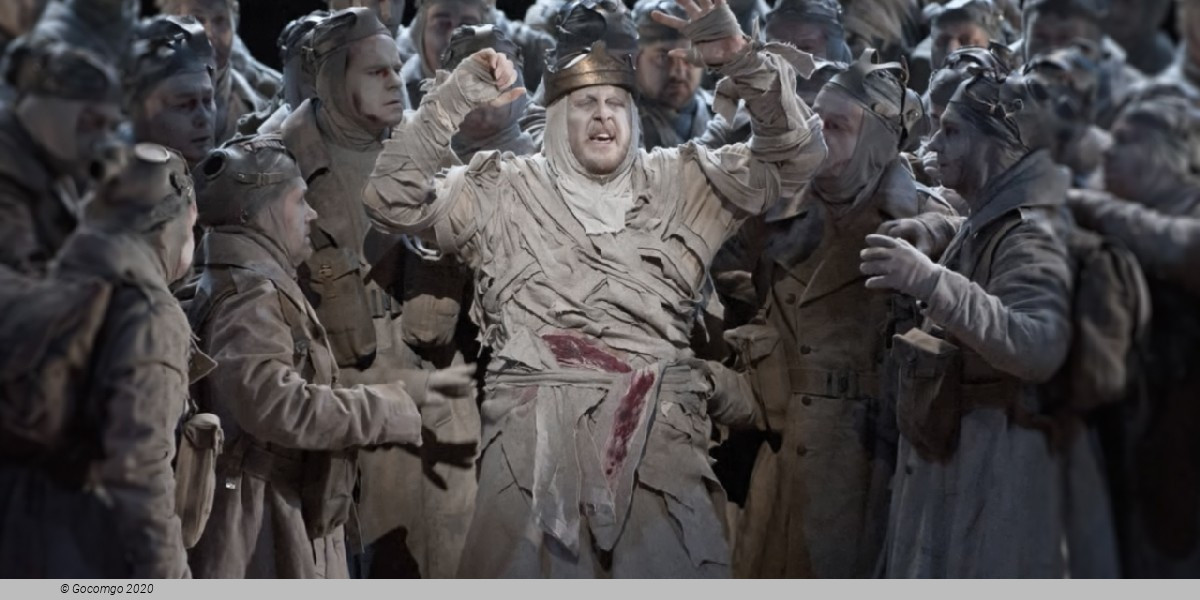
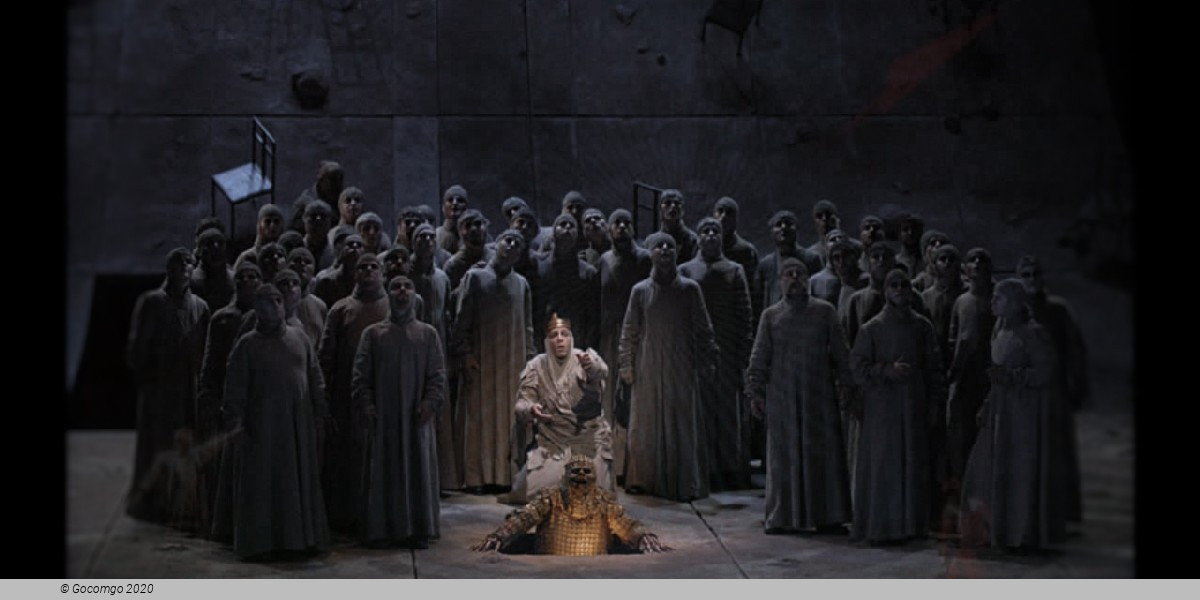
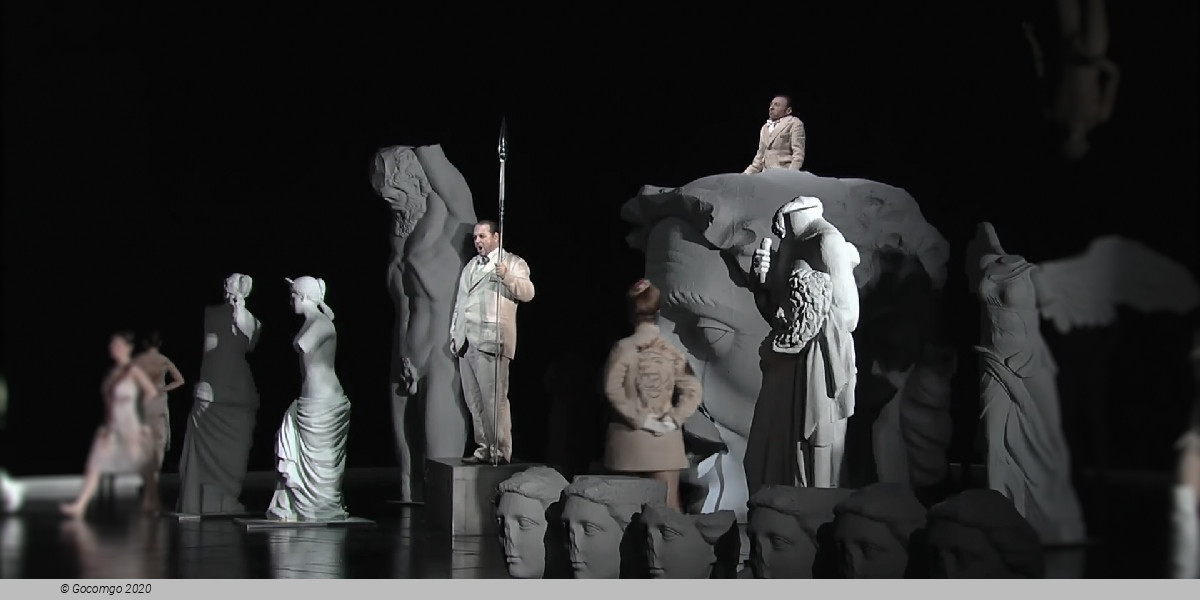
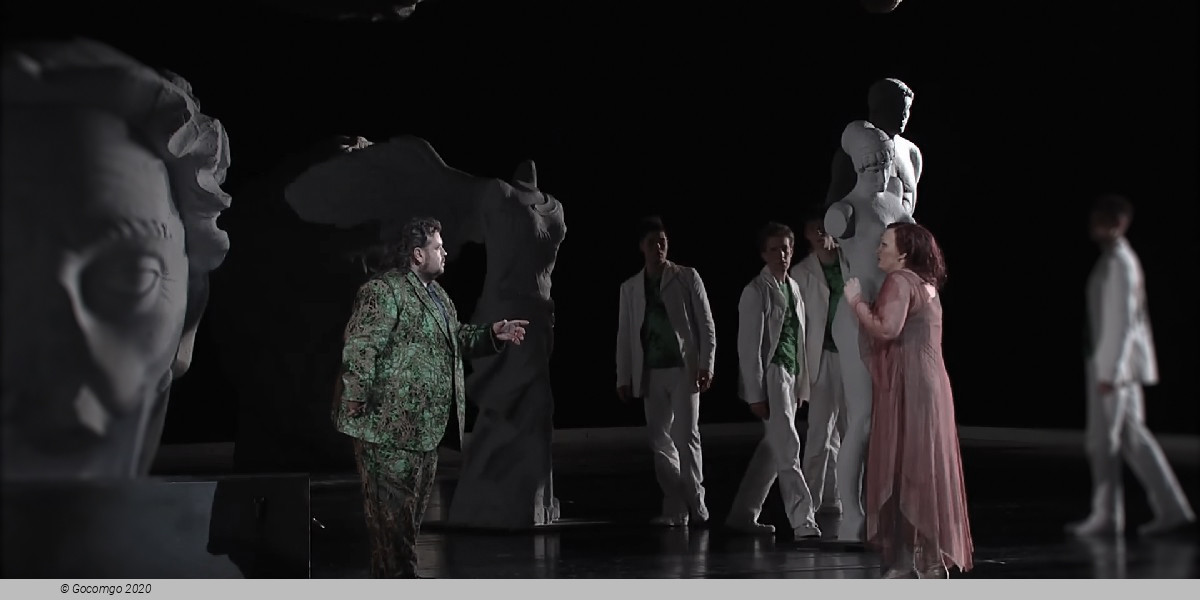
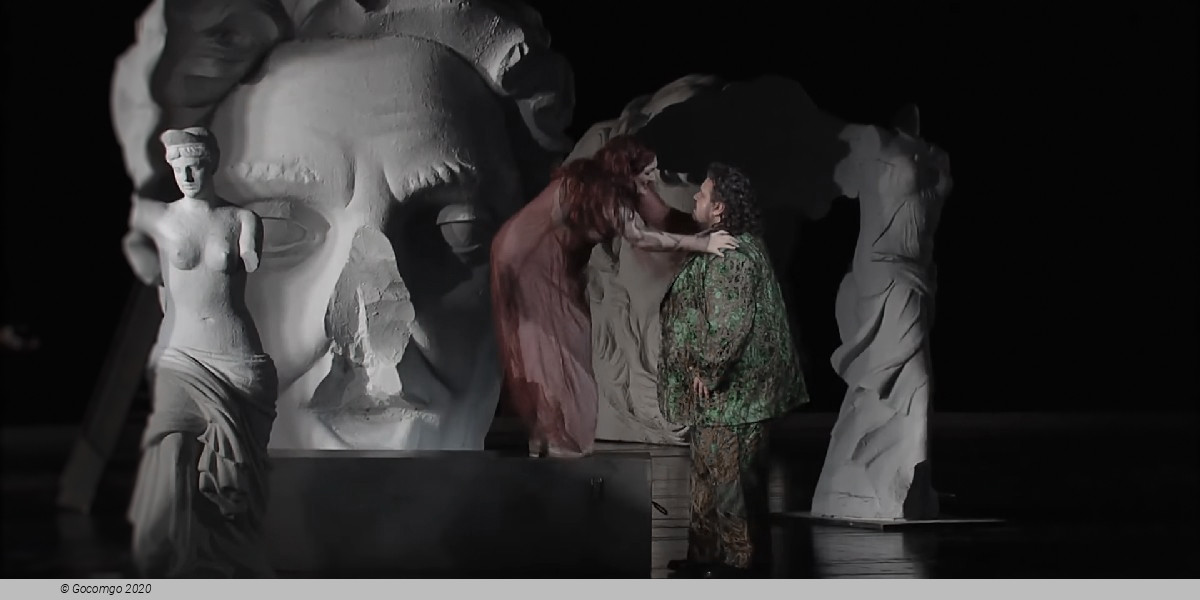
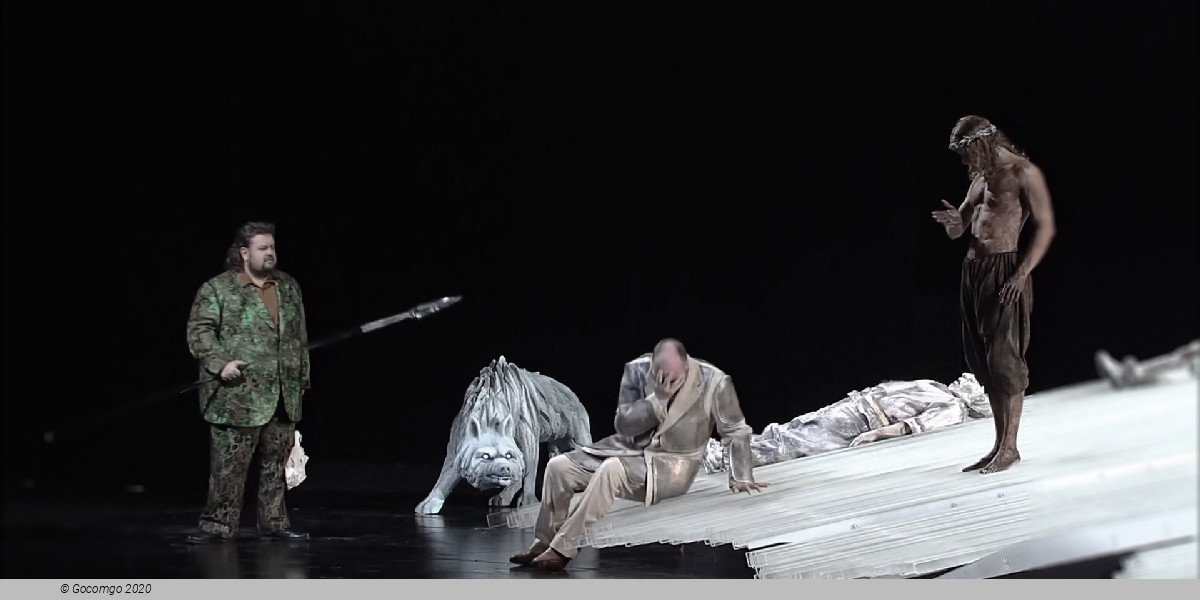
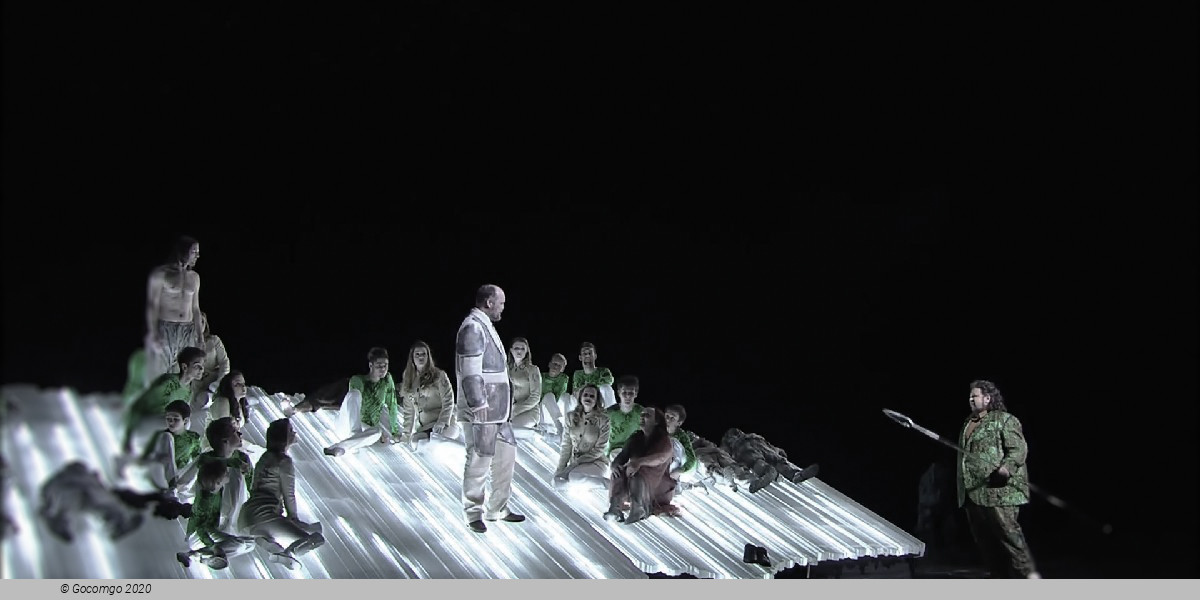
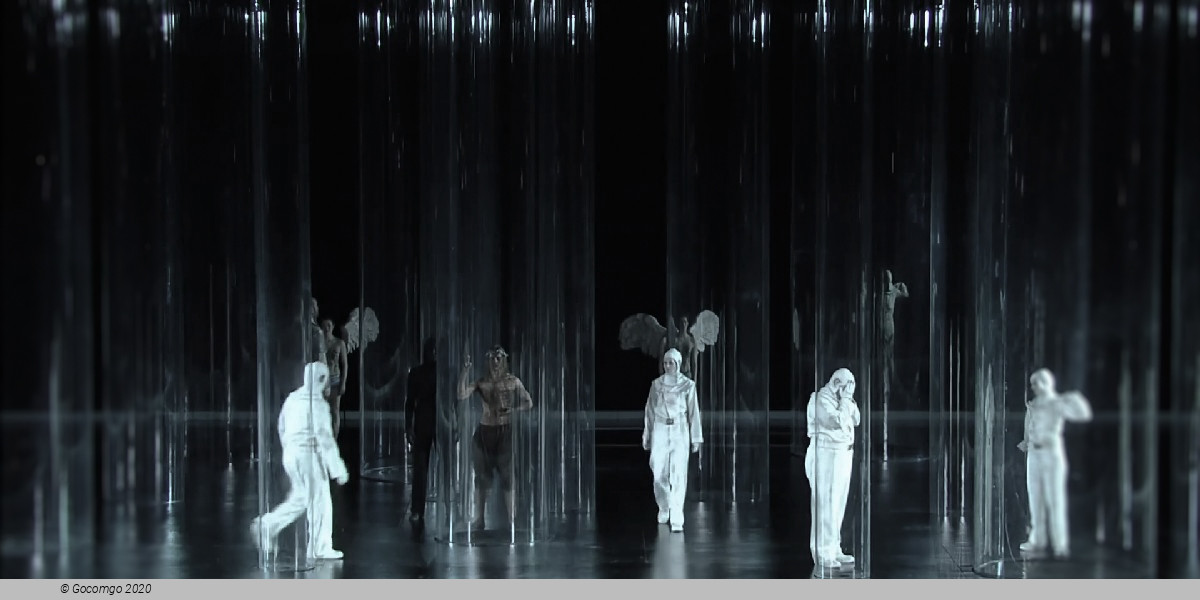
 1 Theatre Square
1 Theatre Square